综英 4 Unit9
综合教程4 Unit 9 How I Found My Voice 课后练习答案 最新
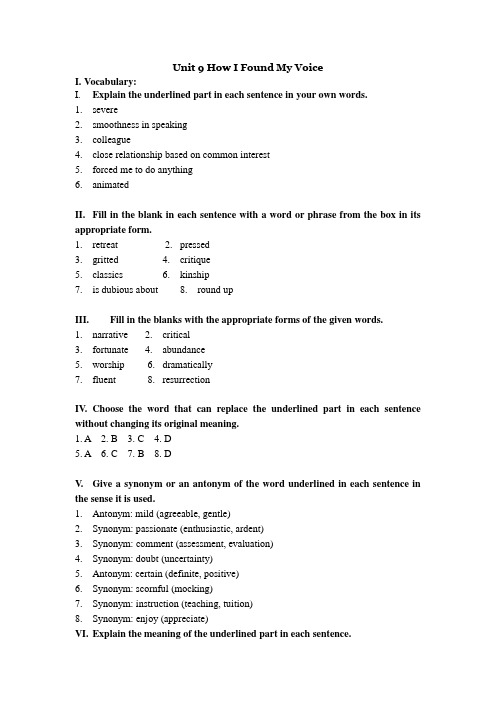
Unit 9 How I Found My VoiceI.Vocabulary:I. Explain the underlined part in each sentence in your own words.1. severe2. smoothness in speaking3. colleague4. close relationship based on common interest5. forced me to do anything6. animatedII. Fill in the blank in each sentence with a word or phrase from the box in its appropriate form.1. retreat2. pressed3. gritted4. critique5. classics6. kinship7. is dubious about 8. round upIII. Fill in the blanks with the appropriate forms of the given words.1. narrative2. critical3. fortunate4. abundance5. worship6. dramatically7. fluent 8. resurrectionIV. Choose the word that can replace the underlined part in each sentence without changing its original meaning.1. A2. B3. C4. D5. A6. C7. B8. DV. Give a synonym or an antonym of the word underlined in each sentence in the sense it is used.1. Antonym: mild (agreeable, gentle)2. Synonym: passionate (enthusiastic, ardent)3. Synonym: comment (assessment, evaluation)4. Synonym: doubt (uncertainty)5. Antonym: certain (definite, positive)6. Synonym: scornful (mocking)7. Synonym: instruction (teaching, tuition)8. Synonym: enjoy (appreciate)VI. Explain the meaning of the underlined part in each sentence.1. place2. preserve3. whereas4. Despite5. very well6. extensionGrammar exercisesI. Note the use of the italicized parts in the following sentences.Can and could can express ability, permission and possibility. In Sentence 1, could expresses possibility. In sentence 9, can expresses permission. In Sentence 8, could see shows the action is in progress. In Sentences 3, 4 and 5, could expresses the general past ability, while in Sentences 2, 6, 7 and 10, could is used in the negative sentences to refer to the past ability, general or specific.II. Correct the errors, where found, in the following sentences.1. I can feel something crawling up my leg.2. He ran very fast and was able to catch the bus.3. By the time she finishes her course, she will be able to speak English well.4. P5. In yesterday's competition, Jane was able to spell the new words without makinga single mistake.6. P7. I talked for a long time, and in the end I was able to make her believe me.8. PIII. Rewrite the sentences where could can be used.1. Could we meet again tomorrow?2. She could sing like an angel when she was a kid.3. John was so drunk that he couldn't open the door.4. /5. /6. You could talk with your teacher.7. No one knows where he is. He could be in Paris. He could be in London.8. Could I use your phone?IV. R ewrite the following short dialogue. Try to make the tone sound more tentative.A: Excuse me, would you open this door?B: I'm afraid it's locked. Shall I get the key?A: Please, if you wouldn't mind, as quickly as you can.V. Insert the adjectives or adverbs given in brackets in the correct positions.1. Three pretty little French girls came to tea yesterday.2. I spent a long happy time living in Germany years ago.3. I have hardly ever worked so hard as I did yesterday.4. We rarely get more than three consecutive days of hot weather in summer.5. There were two hard wooden chairs in the waiting room.6. Mary has often spoken of your kindness to her when she was staying in Austria some years ago.7. Everybody concerned must be ready to leave at 8:30 tomorrow.8. We have not yet obtained all the information you requested yesterday.VI. Make sentences of your own after the sentences given below, keeping the underlined structures in your sentences.(Reference version)1. In its present state, the economy couldn't stand another rise in interest rates.2. He stood as if rooted to the ground.Translation exercisesI. Translate the following sentences into Chinese.1. 从那生活温暖而舒适的鲶鱼之乡搬到气候严酷而且人似乎也大不相同的北方,是一件令人不安的事。
综合英语教程四Unit9ChineseFood

Fish is always served to symbolize accumulations of prosperity and wealth with the New Year's Eve meals.
Long noodle is the symbol of longevity in China, so that youngsters or seniors all will have a bowl of Long Life Noodle in the expectation of a healthy life.
”
The biggest recent change in eating habits and food-related lifestyles is the advent of fast food. This permits many people to eat away from home, or to bring food home to eat without having no prepare it. The famous fast foods are, for example, McDonald’s hamburgers and KFC (Kentucky Fried Chicken).
新编英语教程学生用书4 综英unit9
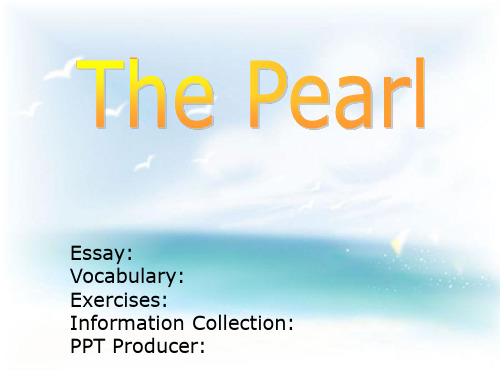
Essay: Vocabulary: Exercises: Information Collection: PPT Producer:Warming--up QuestionsDo you possess any jewelry with pearls?If no, do you want one?Why?Rings EarringsNecklaces Pendants吊坠Bracelets手镯Background 1,Author➢John Ernst Steinbeck, Jr.(February27, 1902 –December 20, 1968) wasone of the most famous Americanwriter of the 20th century.➢Steinbeck's novels dealing with the economic problems of rural labor.➢He is widely known for the PulitzerPrize-winning novel The Grapes ofWrath (1939), East of Eden (1952) andthe novella Of Mice and Men (1937).➢As the author of twenty-seven books, including sixteen novels, six non-fiction books, and five collections of shortstories, Steinbeck received the NobelPrize for Literature in 1962.2,The Pearl➢The Pearl is a novella by American author John Steinbeck, published in1947. It is the story of a pearl diver,Kino, and explores man's nature aswell as greed and evil.➢Steinbeck's inspiration was a Mexican folk tale from La Paz, Baja CaliforniaSur, Mexico, which he had heard in a visit to the formerly pearl-rich region in 1940.➢In 1947, it was adapted into a Mexican film named La perla.➢The story is one of Steinbeck's most popular books and has been widelyused in high school classes.3,La perla➢La perla ("The pearl")is a1947 Mexican film.➢The story is based on thenovella The Pearl by JohnSteinbeck, who also co-wrotethe screenplay for the movie.Skimming(5 minutes)➢What do we know about Kino?A poor fisherman/lives in a brush house/has a child/in great need of money➢What was the news in the town?(sum in a sentence) Kino, a fisherman, had found the Pearl of the World.➢Which people were particularly interested in the Pearl? The priest/the shopkeepers/the doctor/the beggars/the agents of the buyer of pearlsPart Division of the Text Directions: Please divide the text into 3 parts andsummarize the main idea of each part. Part1(Para.1)The news travels very fast in the town.Part2(Para.2--Para.5)How the townspeople react towards the news.Part3(Pare.6)Analysis of people's reaction.Further UnderstandingNews seems to move faster than small boys can scramble and dart to tell it, faster than women can call it over the fences.(L4)Small boys are always unable to keep quietabout anything they know, and tend to runaround talking about it; women are likewise supposedly good at spreading news through gossiping; but the news that Kino had a largeand valuable pearl traveled faster than either....the nerves of the town were pulsing and vibrating with the news--Kino had found the Pearl of the World.(L7) Paraphrase this sentence:The town was alive with thenews that Kino had found thePearl of the World.Background Information:Kino found the Pearl of theWorld when he was out fishing,but before he reached home,the news had already spreadthrough the whole town andwas on everyone's lip.Before panting little boys could strangleout the words, their mothers knew it.(L8)Paraphrase this sentence:The mothers had already learned the newsbefore their sons could stammer it out.The news swept on past the brush houses,and it washed in a foaming wave into the town of stone and plaster.(L9) Paraphrase this sentence:The news spread from one brush house to anotherand continued to travel fast into the town.Every man suddenly became related to Kino's pearl, ... ,so taht he became curiously every man's enemy.(L38)Background Information:In the following part,various people attempt tomurder Kino for the pearl,but they all fail.VocabularyScramble(L4)V.1.to move quickly, especially with difficulty(迅速而吃力地)爬,攀登she managed to scramble over the wall.她好不容易翻过了墙。
综合教程第四册Unit 9 Text I 词汇学习
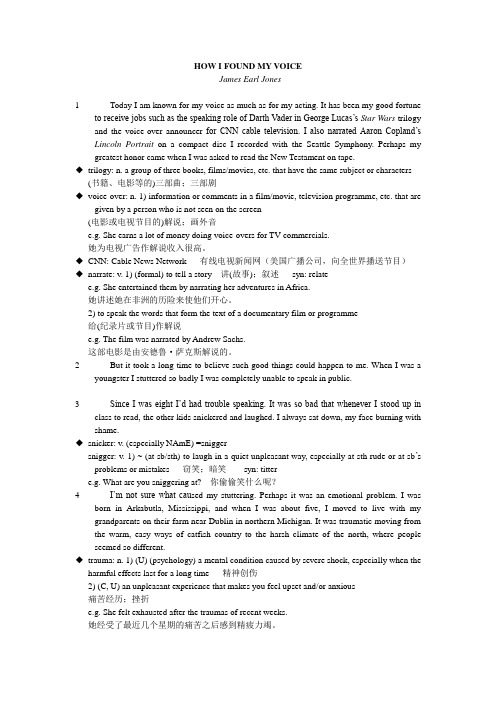
HOW I FOUND MY VOICEJames Earl Jones1 Today I am known for my voice as much as for my acting. It has been my good fortuneto receive jobs such as the speaking role of Darth Vader in George Lucas’s Star Wars trilogy and the voice-over announcer for CNN cable television. I also narrated Aaron Copland’s Lincoln Portrait on a compact disc I recorded with the Seattle Symphony. Perhaps my greatest honor came when I was asked to read the New Testament on tape.◆trilogy: n. a group of three books, films/movies, etc. that have the same subject or characters(书籍、电影等的)三部曲;三部剧◆voice-over: n. 1) information or comments in a film/movie, television programme, etc. that aregiven by a person who is not seen on the screen(电影或电视节目的)解说;画外音e.g. She earns a lot of money doing voice-overs for TV commercials.她为电视广告作解说收入很高。
◆CNN: Cable News Network 有线电视新闻网(美国广播公司,向全世界播送节目)◆narrate: v. 1) (formal) to tell a story 讲(故事);叙述syn: relatee.g. She entertained them by narrating her adventures in Africa.她讲述她在非洲的历险来使他们开心。
unit9新标准大学英语综合教程4答案(含Unit-text)

Reading 11Your answer Correct answer1. illustrate illustrate2. scarcely scarcely3. retain retain4. eliminate eliminate5. proficiency proficiency6. sufficient sufficient7. representation representation2Your answer Correct answer(1) proficiency proficiency(2) sufficient sufficient(3) representation representation(4) eliminate eliminate(5) retain illustrate(6) scarcely scarcely(7) illustrate retaining31. One of the most frustrating parts of learning a foreign language is feeling stupid when youcan't understand something.Your replacement:Your answer Correct answerisolated dumb2. I have to admit that English spelling is difficult for foreigners to understand.Your replacement:Your answer Correct answerconcede concede3. 3 After I accidentally spilt tea on my painting, the picture was a shape that was difficult to seeclearly.Your replacement:Your answer Correct answerblurred blurred4. I need to read and learn again the vocabulary before the next lesson.Your replacement:Your answer Correct answermanipulate revise5. I have a hard time with PowerPoint slides sometimes because it's difficult for me to manage tocontrol and arrange both text and images.Your replacement:Your answer Correct answerrevise manipulate6. I don't think you stop learning when you leave university. Learning should be a continuousprocess throughout your life.Your replacement:Your answer Correct answerongoing an ongoing7. It's difficult to learn listening and speaking as separate skills. To be good at one, you shouldwork on both.Your replacement:Your answer Correct answerdumb isolated8. During my speech, I made a terrible and embarrassing mistake when I mispronounced animportant word.Your replacement:Your answer Correct answerdisgraceful disgraceful4abbab aaaaaReading 21Your answer Correct answer1. elite elite2. infringe infringe3. descendant descendant4. unity unity5. statesman statesman21. Winston Churchill was a leading in Britain during the first half of the 20th century.Your answer Correct answerstatesman statesman2. It's understandable to envy the, who seem to have more privileges and opportunities.Your answer Correct answerelites elite3. I will leave my house and land to my when I die.Your answer Correct answerdescendant descendants4. It's difficult to maintain amongst such different groups with different goals.Your answer Correct answerinfringe unity5. Newspaper reporters have to be careful that they don't upon the privacy of the people thatthey write about.Your answer Correct answerunity infringe31. It is difficult to imagine how much slower communication was during the time period of thetelegraph.Your replacment:Your answer Correct answerepoch epoch2. He worked hard to argue against my claim, but I knew I had the truth on my side.Your replacment:Your answer Correct answerrefute refute3. The manager is supposedly responsible for losing nearly eight per cent of this year's profits.Your replacment:Your answer Correct answerallegedly allegedly4. I was proud to have my article accepted for publication in one of the leading scientific monthlypublications.Your replacment:Your answer Correct answerjournals journals4aabab bbLanguage use1I'm planning to live in South America for the next two years, so I guess there's nothing for it but to learn Spanish.I failed the exam, and my teacher says that there's nothing for it but to take it again.By the time we got to the theatre, the concert had already started and we couldn't get in, so there was nothing for it but to turn around and go home.Because I wasn't earning enough money at my job, there was nothing for it but to take a second job on the weekend.My computer crashed and I lost my essay, so there was nothing for it but to write it again.2I would drink soda water only if I were dying of thirst in the desert.I could marry you only if you were the last man on earth.I would jog only if someone ran behind me and beat me with a stick to make me do it.I would watch romantic comedies only if my girlfriend begs me.I would take care of a dog only if someone paid me.3Our teacher said we had to write a ten-page essay about the book we read. That's quite a few pages for a book report.In the summer, temperatures in Hangzhou can reach 42 degrees. That's quite a little hot for me.If you are not surrounded by city lights, it's possible to see around 6,000 stars at night without a telescope. That's quite a few stars.In 2008, there were about 93,000 scheduled airline flights per day. That's quite a few flights.Ladies and gentlemen, I'd like to say a few words about the topic of global warming.41. It is believed that the meeting will help between the two countries.Your answer Correct answer(1) promote promote(2) growth understanding2. It is difficult to a conversation with all this noise around us.Your answer Correct answer(1) carry carry(2) on on3. Stress at work can often be into your home life.Your answer Correct answer(1) turned carried(2) down over4. The Department of Education has launched a(n) aimed at immigrants who want to learn English.Your answer Correct answer(1) personal advertising(2) remarks campaign5. Stressful environments lead to unhealthy behaviours such as poor eating habits, which increasethe risk of heart disease.Your answer Correct answer(1) turn in(2) to turn6. It took him the whole evening to pack all his.Your answer Correct answer(1) campaign personal(2) sales belongings7. The is aimed at teenagers to warn them of the dangers of tobacco.Your answer Correct answer(1) campaign anti-smoking(2) advertising campaign5你听说过万里长征吗?和学汉语相比,那简直就是在公园里漫步,不值一提。
综合英语4-Unit 9 Vocabulary
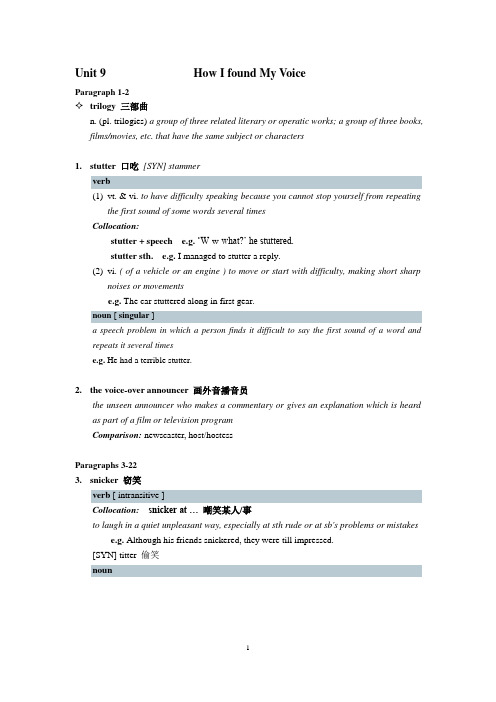
Unit 9 How I found My VoiceParagraph 1-2trilogy 三部曲n. (pl. trilogies) a group of three related literary or operatic works; a group of three books, films/movies, etc. that have the same subject or characters1.stutter 口吃[SYN] stammerverb(1)vt. & vi. to have difficulty speaking because you cannot stop yourself from repeatingthe first sound of some words several timesCollocation:stutter + speech e.g. ‘W-w-what?’ he stuttered.stutter sth. e.g. I managed to stutter a reply.(2)vi. ( of a vehicle or an engine ) to move or start with difficulty, making short sharpnoises or movementse.g. The car stuttered along in first gear.noun [ singular ]a speech problem in which a person finds it difficult to say the first sound of a word andrepeats it several timese.g. He had a terrible stutter.2.the voice-over announcer 画外音播音员the unseen announcer who makes a commentary or gives an explanation which is heard as part of a film or television programComparison:newscaster, host/hostessParagraphs 3-223.snicker 窃笑verb [ intransitive ]Collocation: snicker at …嘲笑某人/事to laugh in a quiet unpleasant way, especially at sth rude or at sb's problems or mistakese.g. Although his friends snickered, they were till impressed.[SYN] titter 偷笑noun4.in public:If you do sth. in public, people in general will hear about it or see it.e.g.She was too proud to show her grief in public.On this occasion, we departed from our normal practice of holding the meetings in public.Antonym: in privatee.g.Cecil can be very rude in private, though in public he is usually polite.5.traumatic: a. 不顺心的,受创伤的,外伤的AmE / trae’mætik /adjective(1)extremely unpleasant and causing you to feel upset and/or anxious; distressing;emotionally disturbinge.g. a traumatic experienceDivorce can be traumatic for everyone involved.(2)[ only before noun ] ( psychology or medical ) connected with or caused by traumatraumatic amnesia (外伤性健忘症)e.g.The onset of depression often follows a traumatic event.抑郁症发作常常发生在遭受创伤之后。
综合英语4 unit9 How I found My Voice
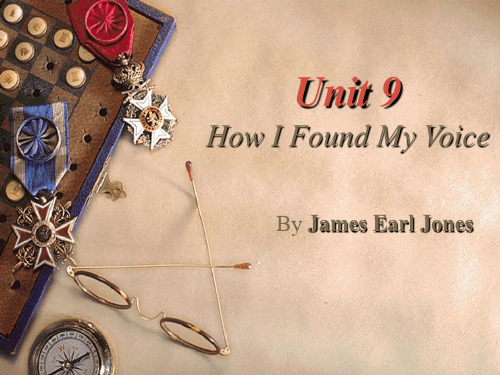
Part Three (Paragraphs 23-29):
The concluding part shows various honors and successes the writer has obtained, which further emphasizes the great effect the teacher has brought about on the writer’s career as well as his whole life.
Part Two (Paragraphs 3-22):
This part mainly describes the author’s stuttering problem when he was a child and the process of how Prof. Crouch helped the boy tackle the problem by way of forced public speaking.
/programs/view/uoE QPA-BOPU/ Life shrinks and expands in proportion to one’s courage. --- Anais Nin
Structural analysis This autobiographical narration comprises three parts.
He moved to his maternal grandparents' farm in Jackson, Michigan at the age of five, but the adoption was traumatic and he developed a stutter so severe he refused to speak aloud. When he moved to Brethren, Michigan in later years a teacher at the Brethren schools started to help him with his stutter. He remained functionally mute for eight years until he reached high school. He credits his high school teacher, Donald Crouch, who discovered he had a gift for writing poetry, with helping him out of his silence. The teacher believed forced public speaking would help him gain confidence and insisted he recite a poem in class each day. "I was a stutterer. I couldn't talk. So my first year of school was my first mute year, and then those mute years continued until I got to high school."
综合英语4 Unit9-Unit14 课文课后翻译
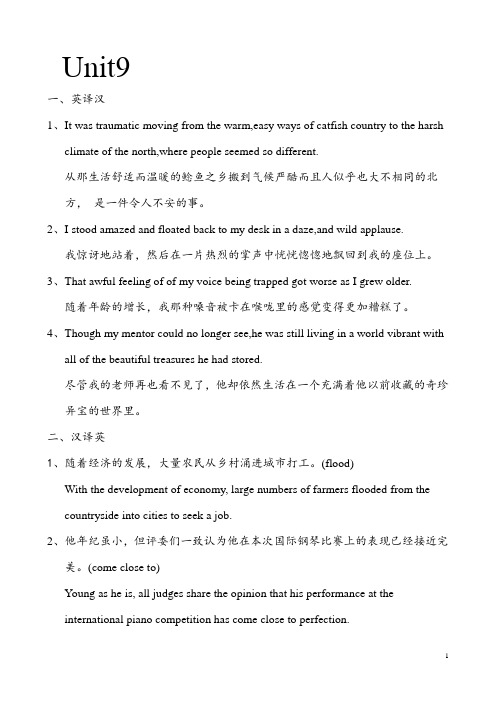
Unit9一、英译汉1、It was traumatic moving from the warm,easy ways of catfish country to the harshclimate of the north,where people seemed so different.从那生活舒适而温暖的鲶鱼之乡搬到气候严酷而且人似乎也大不相同的北方,是一件令人不安的事。
2、I stood amazed and floated back to my desk in a daze,and wild applause.我惊讶地站着,然后在一片热烈的掌声中恍恍惚惚地飘回到我的座位上。
3、That awful feeling of of my voice being trapped got worse as I grew older.随着年龄的增长,我那种嗓音被卡在喉咙里的感觉变得更加糟糕了。
4、Though my mentor could no longer see,he was still living in a world vibrant withall of the beautiful treasures he had stored.尽管我的老师再也看不见了,他却依然生活在一个充满着他以前收藏的奇珍异宝的世界里。
二、汉译英1、随着经济的发展,大量农民从乡村涌进城市打工。
(flood)With the development of economy, large numbers of farmers flooded from the countryside into cities to seek a job.2、他年纪虽小,但评委们一致认为他在本次国际钢琴比赛上的表现已经接近完美。
(come close to)Young as he is, all judges share the opinion that his performance at theinternational piano competition has come close to perfection.3、也许是因为喝了烈性酒的关系,她在去伦敦的路上一直恍恍惚惚的。
综合英语教程4第三版unit9The Idiocy of U

综合英语教程4第三版unit9The Idiocy of U课文精解My Idea of a Happy Family1.All happy families resemble one another;every unhappy family is unhappy in its own fashion.①幸福的家庭有同样的幸福,而不幸的家庭则各有各的不幸。
此句出自列夫托尔斯泰的《安娜·卡列尼娜》。
②列夫·托尔斯泰(Leo Tolstoy)是俄国小说家、评论家、剧作家和哲学家,同时也是非暴力的基督教无政府主义者和教育改革家。
著有《战争与和平》、《安娜·卡列尼娜》和《复活》等经典长篇小说。
③《安娜·卡列尼娜》讲述的是发生在19世纪俄国的一个悲剧爱情故事。
故事围绕着安娜·卡列尼娜进行。
她为了佛伦斯基抛弃了她的家庭。
但是他们之间的爱情并没有让她感到幸福,因为佛伦斯基因频繁地参加社交活动,而疏远了安娜。
最后,不堪忍受内心嫉妒的折磨,安娜卧轨自杀。
Husband and Wife in a Cross-Cultural Marriage文章是关于具有不同文化背景的丈夫和妻子对于家庭问题的不同看法。
①在美国文化中,家庭只包括父母和孩子;而在中国文化中,家庭是由父母、孩子和关系密切的亲属共同构成的大家庭。
②美国的婚姻文化更强调个人的独立性,而中国则更注重对于和家庭成员之间的联系。
③西方的婚姻观认为应该由新娘支付婚礼的费用;而中国的传统婚姻观认为应该由新郎承担一切婚礼开销。
A Cornucopia of Thanks1.Cornucopia原意指“哺育宙斯的羊角”,现用于作为丰收富裕的象征。
2.I am thankful for Velcro tennis shoes.Velcro 瑞士生产钩毛搭扣的一个品牌,现用于指该品牌下的所有产品。
3.I am thankful for swim diapers,because every time my son wanders into water in plain disposables,he ends up wearing a blimp the size of,say,New Jersey,on his bottom.plain disposable指的是普通的游泳纸尿裤。
综合英语教程四_Unit_9_Chinese_Food.

▪ in matter of 与...有关 ▪ in the matter of 至于; 关于, 在...方面 ▪ it is no matter that ...是无关紧要的 ▪ let the matter drop [go, rest]听任事情自然发展
▪ make a matter 大惊小怪, 引起一场风波 ▪ make matters [it] worse更坏的是, 更糟的是 ▪ make sth. a matter of conscience凭良心做某事
stop 后面加不定式表示停下现在的动作去干另一件事, 加动名词表示停下现在正在做的事。
mean 后面加不定式表示打算去一件事,加动名词表示 意思是什么。
.
Questions:
1. What did you have for dinner last night?
2. Please make a list of three Chinese dishes and one Western dish.
Unit Nine
.
The author and the text
Tom McArthur, Professor of English at the University of Quebec , is editor of the journal English Today and the full Oxford Companion to the English . The text is taken from The Written Word , Oxford University Press 1987.
.
Chinese Cooking Methods:
▪ Roasting: ▪ Boiling: ▪ Shallow frying: ▪ Stewing ▪ Red-cooking ▪ Stir Frying ▪ Deep frying
综合英语教程四_Unit_9_Chinese_Food

served to symbolize and snacks, which
accumulations of symbolize good wishes
prosperity and
under special
wealth with the
circumstances. These
New Year's Eve meals.
Food is a basic necessity, so every culture has important norms and customs related to it. Most cultures have food preferences and food taboos, (e.g. Hindus don’t eat beef, Muslims don’t eat pork,…)
1.verbs for ways of cooking:
steam, boil, fry, roast, stew, bake, braise,…
蒸,煮,炸, 煎, 烹,
烤,焖
2. expressions for types of food:
hot pot, jiaozi/dumplings, rice, noodle, Chinese sandwich, staining tofu, rice with fried vegetables
Usually, an honored guest will be served a snapper's head or shell to hail him and show warmly welcome in some districts.
Fish is always
新通用大学英语综合教程第四册听力及答案 Unit 9

Unit 9 History’s MysteriesUnit Goals1. Talk about the out-of-the-ordinary2. Present a theory about a past event3. Discuss how believable a story is4. Evaluate the trustworthiness of news source5. Write about one mysterious phenomenonLesson 1Lead-inOn-the-Stree t Interview: I don’t believe everything I read…A. Check each statement True or False.1. False2. False3. True4. False5. TrueB. Use information from the video segment to complete each sentence.1. the Internet, newspapers; television2. newspapers3. Austria, the USA, Great Britain4. spam, or unknown sourcesVideo ScriptInterviewer: Do you use the Internet at all?Mauro: Yes I do. Quite a lot, in fact.Interviewer: Do you use it to gather news, to ... like a newspaper, but ... ?Mauro: Well, I surf around a lot, actually. I tend to look for new sites and get information that is not so common in newspapers, for example.Interviewer: And do you feel that when you get information from the Internet, that you can trust it to be true? Do you fe el comfortable that it’s real?Mauro: You can never trust information, even from the newspapers. The newspapers sometimes print information that is not true for the mere fact that it comes from sources that are not true. And the same goes for the Internet.Maiko:I get news from Internet more than a newspaper or watching TV I think it’s, in terms of speed in how fast it gets to people, I think Internet is very good. In terms of credibility, I think; well, I think it’s almost the same thing, Internet, newspa per, and news on TVRob: I probably put too much faith in what I read although I try to use various sources in getting my news. That’s one way I judge to know if what I’m reading is ... is, you know, the truth or not.Christiane:I get my news over the Internet every day. I actually get three different newsletters on a daily basis. I get one from Austria, I get one from the USA, and I get one from Great Britain. So I get international news and thus can also evaluate which news are really, in the end, the real news, because I get them from all different sources. Lorayn:I don’t believe everything I read, whether it’s on the Internet or a newspaper or if I listen to it on TV I do believe that there are credible sources out there, and if I’ve heard … if I’ve he ard something or read something on the Internet, if it comes from a credible source, then I tend to believe it. There’s a lot out there that’s not too credible.You have to be very careful.Interviewer: And how do you try to be careful?Lorayn: If it’s spa m e-mail that comes or something that’s from a source that I don’t know, I tend not to ... not to put 100 percent trust into it. If it comes from the New York Times or if it comes from a reputable source, I tend to take that for 100 percent.ListeningTalk About a MysteryPart 1A. Sound BitesRead and listen to a conversation about a well-known mystery.Teaching Suggestions●Have students look at the image and read the caption. Ask:Who’s Bigfoot? (a hairy human-like creature)Where was he seen? (in the United States)Is this image proof that Bigfoot existed? (no)Why? (because the creature in the image is a man dressed in a costume)Do you think it was ever believed to be proof of Bigfoot’s existence? (Probably. It was taken in 1967, and Bob Heironimus di dn’t tell the truth until 2004.)●Have students read and listen to the conversation.●To check comprehension, ask:What led Victor to believe that Bigfoot exists? (a TV program)What would Patty need to believe Bigfoot exists? (to see it herself)Language note: Could’ve been is the short form used in spoken English of It could have been.There’s no such thing as ... is an expression that means that something does not exist.Culture note: The image is a still from a sixty-second film by Roger Patterson. It was one of the most important pieces of evidence that Bigfoot existed until Bob Heironimus confessed in 2004 that he dressed in a costume for the picture. People have claimed to have seen Bigfoot in the U.S. and Canada for hundreds of years. The creature was originally named Sasquatch, which means hairy giant, by Native Americans and then nicknamed Bigfoot because of large footprints that have been found and are thought to be from this creature.Corpus Notes:The expression buy [that] story is used almost exclusively in informal spoken English.B. Pair WorkRead the conversation again. With a partner, explain the meaning of each of the following statements.Answers will vary, but may include:1. I can’t believe you think that story is true!2. You always doubt everything!3. Bigfoot is definitely real.4. You’ve got to be kidding!5. You think up some crazy things!6. I have to see something with my own eyes to believe it’s true.Teaching Suggestions●Have students find and underline the statements in the conversation and note whosaid them. Encourage students to consider Victor's and Patty's views on the Bigfoot mystery to help them work out the meaning of the expressions.●In pairs, have students write a sentence explaining the meaning of each statement orquestion.●Review as a class. Call on different students to explain the meanings of thestatements.Option:If they haven’t already done so, have students underline the statements from Exercise B. Using their explanations of the meanings of the statements, have pairs think of different ways to say each of the statements. Call on pairs to read the Sound Bites conversation again, substituting the new statements for the underlined ones.Option:In pairs, have students describe Victor’s and Patty’s personalities. If necessary, prompt students by asking Who would you describe as gullible? Who would you describe as skeptical? Have students support their answers with information from the conversation. Encourage students to discuss who they identify with and why.Part 2Discuss How Believable a Story IsA. Word SkillsUsing adjectives with the suffix -able.Teaching Suggestions●Have students listen to the words and study the definitions. Then have students listenand repeat the words chorally.●Point out that words ending in the suffix -able are adjectives. Ask students what verbeach adjective comes from. (believe, debate, prove, question, solve)●To check comprehension, draw a continuum (without the answers) and word box onthe board. With books closed, have students choose the correct words from the box to complete the continuum with:Language note:Be sure students don’t confuse provable with probable, which means possible. Questionable also means possibly not honest or morally wrong; for example, His behavior is highly questionable. While believable implies that something is possibly true,unbelievable implies that something is almost certainly not true.Corpus Notes: The collocation highly questionable occurs much more frequently than very questionable.B. Complete each statement, using an adjective with the suffix -able. Use eachadjective only once.1. questionable2. believable3. debatable4. provable5. unsolvableTeaching SuggestionsHave students compare answers with a partner and review as a class.C. Listening Comprehension.Listen to Part 1 of a historical mystery.What happened to the Russian royal family? What was mysterious about this event?The entire family was murdered. It was mysterious because, until 1991, the bodies had not been found. There was also a woman who claimed to be one of the daughters.ScriptPart 1 [H = male host; J = Professor John Morgan, England]H: Our guest tonight is John Morgan, professor of Russian history at Cambridge University. Professor Morgan, the murder of Czar Nicholas II and the royal family of Russia in 1918 is one of the great mysteries of the twentieth century. Tell us the basic story of what happened.J:Well, in 1917, during the Russian Revolution --- with the end of the Russian monarchy --- the czar’s family was moved from St. Petersburg east to the Ural Mountains, supposedly for their protection. There was, of course, the czar ... his wife Alexandra ...and their children --- four daughters and a son, Alexei, who would have been the next czar --- and also the family doctor and several servants. According to the story, late one evening, they were all brought into a room and told that they were going to have their photograph taken. But to their surprise, soldiers suddenly came into the room firing guns and the entire family was murdered.H: And what makes this story such an enduring mystery?J: Well to begin with, until 1991 at least, no one had ever found the bodies. Stories spread about how the son, Alexei, and maybe also Anastasia, the youngest daughter, had escaped the execution and were still alive. Several women claimed to have been Anastasia --- the most famous person who claimed to have been Anastasia was an Anna Anderson, in Berlin in 1920. Many people found her story very believable, including other members of the Russian royal family. Anna Anderson --- or Anastasia, if you believed her --- died in the United States in 1984.Teaching SuggestionsPre-listening: Ask Who are these people? (the Russian royal family) Elicit from the class any information that they know about the Russian royal family.●Have students read the title, look at the map and photos, and read the captions.●First listening: Have students listen for information about what happened to the royalfamily and why it is a mystery. Then have students discuss in pairs.●Second listening: Have students listen to confirm or correct their answers. (Possibleresponse: They were murdered. It is a mystery because the bodies weren’t found until 1991, and Alexei and Anastasia were said to have escaped. Several women have claimed to be Anastasia.)●To review, have volunteers share their answers with the class.Language note:If necessary, explain the following: enduring(lasting for a long time); czar (ruler of Russia before 1917).Culture note: The October Revolution of 1917 put an end to the absolute monarchies that ruled Russia for centuries. After the revolution, the country was named Union of Soviet Socialist Republics (USSR) under the leadership of Vladimir Lenin, the first dictator of the USSR. Yekaterinburg (on the map) is where the family is believed to have been moved and then killed.D. Now listen to Part 2.What happened in 1991, and what facts did it seem to prove? Why is it still a mystery?Researchers found nine bodies in the Ural Mountains. Medical testing showed that five of them were members of the royal family. But the bodies of the son and one of the daughters were still missing.ScriptPart 2H:Professor Morgan, you mentioned no one had a clue where the bodies were until 1991. Tell us about that.J: Well, people assumed that the bodies must have been lost forever, until 1991, when researchers found nine bodies in the Ural Mountains. Through medical testing they were able to confirm that five of the bodies had to have been Czar Nicholas, his wife, and three of their four daughters.H:That must’ve been pretty exciting news for a lot of people.J: No doubt about it. And they were able to conclude that the other four bodies were definitely not members of the czar’s family. Instead, it was believed that they were most likely the bodies of the doctor and three of the servants. But the bodies of the son, Alexei, and one daughter were still missing.H: Well, what about Anna Anderson, who claimed to be their daughter, Anastasia?Wouldn’t her story have been provable through medical testing too?J: Yes --- and it was. After they found the bodies of the royal family in 1991, medical testing on Anna Anderson’s body proved that she was not a member of the royal family. As a matter of fact, it proved that she wasn’t even Russian!H: How do you like that! Well, that’s one mystery solved.J: Right. But just when we thought the mystery of what happened to their bodies wassolved, a team of scientists have recently argued that the results of the medical testing done on the nine bodies in the 1990s was highly questionable --- poorly done and full of errors, and it might not have proved without a doubt that the bodies were the royal family after all.H:Well, I guess some mysteries just never die, do they?J:Not this one. It might just be an unsolvable case.H:Well, thank you Professor Morgan. That was very interesting.J:Thank you for having me.Teaching Suggestions●Have students listen for the answers to the questions. Ask them to take notes whilethey listen.●To review, call on volunteers to share their answers with the class.Option: On the board, write:1. The results of the medical testing in 1991 are ______ because ______.2. Anna Anderson's story could have been ______ through medical testing if ______.3. Professor Morgan says the mystery might be ______ because ______.Have students complete the first blank with an adjective from Exercise A and the second blank with their own ideas to make a logical sentence. Review as a class. (Possible statements: 1. questionable, a lot of errors were made; 2. provable, it had been properly done; 3. unsolvable, proof of what actually happened may never be found)E. Complete each statement, according to the listening. Listen to Part 2 again ifnecessary.1. a2. b3. a4. aTeaching Suggestions●Have students complete the statements individually and compare answers with apartner.●If necessary, have students listen again to confirm or correct their answers.●In pairs, have students support their answers with information from the listening.●Review as a class. Have students support their answers. For example, 1. The correctanswer is A because Alexei’s body has never been found, so there is no proo f that he was executed.Option: To give students a chance to express their personal opinions, have them speculate about the mystery of Russia’s last royal family in small groups. Ask students to support their views. Encourage the use of perfect modals in the passive voice for speculating about the past. To finish, call on a few volunteers to share their speculations with the class.SpeakingSpeculate About the Out-of-the-ordinaryA. Conversation SnapshotTeaching Suggestions●Before students read and listen, have them look at the photo and predict what thewomen are talking about. To prompt students, ask What is the woman on the left looking at? (her watch) How many plates are there on the table? (three) What do you think they are talking about? (Possible response: the person they are waiting for)●After students read and listen, check comprehension by asking Who are the womenwaiting for? (Stacey) Do they know why she’s late? (no) What might have caused her delay? (the traffic)●Have students read and listen to the ways to say “I don’t know.” Point out that theyare all informal ways to say that you don’t know something. Beats me is very informal, but it is not offensive.Language note: The out-of-the-ordinary is something that is different from what is usual or expected. I’ll bet means that you’re almost sure something is true.Rhythm and Intonation PracticeTeaching SuggestionsHave students repeat chorally. Make sure they:✧pronounce the contraction ’d in She said she’d ...✧use rising intonation for Do you think something happened?✧use falling intonation for Why else would she be late?✧use emphatic stress for sure in I’m sure it’s nothing, for I’ll in I’ll bet she’s ... , for else inWhy else … , and for can’t in I can’t imagine.✧use the following stress pattern:B. Indirect Speech with ModalsTeaching Suggestions●Have a volunteer read the Remember note and the example out loud. Write theexample on the board:“I went to the store.” → She said [that] she had gone to the store.Point to the reporting verb in the indirect speech statement (said) and ask Is this verb in a present or past form? (past) Did the verb in the reported speech change?(yes) How did it change? (went changed to had gone)●Remind students that when the verb in the reported speech changes or “backshifts,”present becomes past and past becomes past perfect.●Have students read the second and third explanations and study the backshifts in theexamples.●Point out that both must and have to change to had to in indirect speech.●Point to the box of modals that backshift and modals that don’t backshift.●Read the Remember box and the example out loud. Remind students to changepronouns and possessives when they change direct speech to indirect speech.●To check comprehension, write on the board:John told Irene, “I may work late because 1 have to finish a report.”Ask What words in these sentences will change when we put them into indirect speech? Circle the words as students respond. (I, may, I, have) Then elicit the correct indirect speech from the class. (John told Irene [that] he might work late because he had to finish a report.)●Have a student read the last explanation out loud. To check comprehension, write thefollowing on the board. Elicit the indirect speech from the class:“They should have known.” → He said _________________.Corpus Notes: Indirect speech occurs much more frequently without that than with.C. Oral WorkChange each sentence from direct to indirect speech and practice with your partner.1. He told me [that] I shouldn’t worry if he arrives a little late.2. He said [that] students had to arrive fifteen minutes early.3. He said [that] Jack might have gotten lost.4. She said [that] they might have forgotten their luggage.5. She told me [that] she’d call me as soon as she got there.6. She told us [that] she might have to cancel the meeting.7. He told me [that] he would come early.8. She told me [that] I ought to phone first.Teaching Suggestions●To review the difference in use between say and tell, ask When do we use say andtell? (We use say when we don’t mention the listener. We use tell when we mention the listener.) Elicit contrasting examples from students. (Possible responses: He said that he would be late; He told me that he would be late.) If necessary, write an example with each verb on the board.●Model the first item with the class. Ask What is going to change in indirect speech?(You → I; I → he; arrive → arrived)●Have students compare answers with a partner and review as a class.ReadingText ABackground InformationAlabamaAlabama is located in the east south central United States, at the southern end of the Appalachian Mountains and on the Gulf of Mexico. It is one of the principal states of the South and is often referred to as the Heart of Dixie. In the course of about 450 years, Spanish, French, British, and Confederate flags, as well as the Stars and Stripes, have flown over Alabama, and residents of the state have a deep-seated sense of history. Alabama entered the Union on December 14, 1819, as the 22nd state. The state capital, Montgomery, became the provisional capital of the Confederate States of America in 1861 and is popularly known as the Cradle of the Confederacy.Key Words and Expressionsconfirm v.证实The new evidence has confirmed the first witness’s story.Research has confirmed that the risk is higher for women.erase v.删除;抹去Unfortunately, the tape has been erased.The World Bank has agreed to erase the debt.knock … out打晕某人Tyson knocked out his opponent in Round 5.The shock from an electric eel is powerful enough to knock a man out. play tricks on 捉弄某人The girls were always playing tricks on their teacher.Fate played a cruel trick on him when he was badly injured in his firstinternational game.Reference Translation今日城市传说城市传说指被普遍认为真实的不确定或离奇故事。
(完整版)Unit9HowIFoundMyVoice课文翻译综合教程四
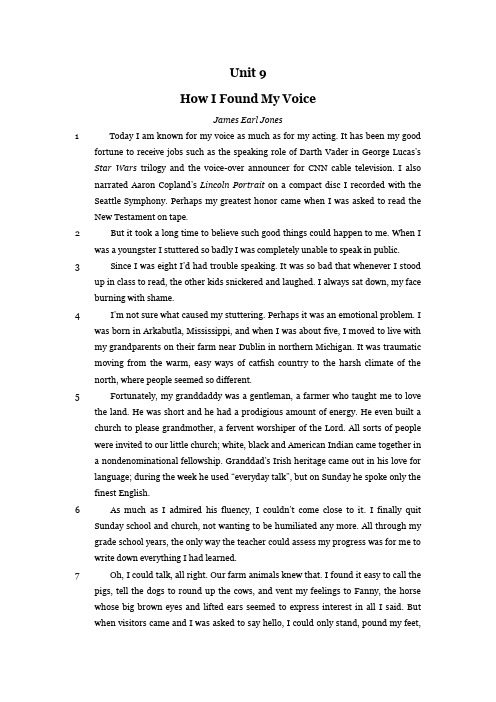
Unit 9How I Found My VoiceJames Earl Jones1 Today I am known for my voice as much as for my acting. It has been my goodfortune to receive jobs such as the speaking role of Darth Vader in George Lucas’s Star Wars trilogy and the voice-over announcer for CNN cable television. I also narrated Aaron Copland’s Lincoln Portrait on a compact disc I recorded with the Seattle Symphony. Perhaps my greatest honor came when I was asked to read the New Testament on tape.2 But it took a long time to believe such good things could happen to me. When Iwas a youngster I stuttered so badly I was completely unable to speak in public.3 Since I was eight I’d had trouble speaking. It was so bad that whenever I stoodup in class to read, the other kids snickered and laughed. I always sat down, my face burning with shame.4 I’m not sure what caused my stuttering. Perhaps it was an emotional problem. Iwas born in Arkabutla, Mississippi, and when I was about five, I moved to live with my grandparents on their farm near Dublin in northern Michigan. It was traumatic moving from the warm, easy ways of catfish country to the harsh climate of the north, where people seemed so different.5 Fortunately, my granddaddy was a gentleman, a farmer who taught me to lovethe land. He was short and he had a prodigious amount of energy. He even built a church to please grandmother, a fervent worshiper of the Lord. All sorts of people were invited to our little church; white, black and American Indian came together ina nondenominational fellowship. Granddad’s Irish heritage came out in his love forlanguage; during the week he used “everyday talk”, but on Sunday he spoke only the finest English.6 As much as I admired his fluency, I couldn’t come close to it. I finally quitSunday school and church, not wanting to be humiliated any more. All through my grade school years, the only way the teacher could assess my progress was for me to write down everything I had learned.7 Oh, I could talk, all right. Our farm animals knew that. I found it easy to call thepigs, tell the dogs to round up the cows, and vent my feelings to Fanny, the horse whose big brown eyes and lifted ears seemed to express interest in all I said. But when visitors came and I was asked to say hello, I could only stand, pound my feet,and grit my teeth. That awful feeling of my voice being trapped got worse as I grew older.8 Then when I was 14, Professor Donald Crouch came to our school. He was aretired college professor who had settled in nearby Brethren, a Mennonite community. When he heard that our agricultural high was teaching Chaucer, Shakespeare and other classics, he couldn’t stand not being a part of our school. So he left his retreat to teach us English, history and Latin.9 Donald Crouch was a tall, lean man with gray hair; English was his favoritesubject, poetry was his deepest love. He’s been an associate of Robert Frost. He helda book of poems as if it were a diamond necklace, turning pages as if uncoveringtreasures. He memorized a poem every day, explaining that if he ever lost his eyesight he would still be able to savor all that beauty.10 When he learned that I not only loved poetry but was writing it, we found akinship. There was, however, one difficulty between us. Professor Crouch (we always called him that) could not stand the fact I refused to read my poems to the class.11 “Jim, poetry is meant to be read aloud, just like sermons,” he pressed. “Youshould be able to speak those beautiful w ords.”12 I shook my head and turned away.13 Then he tricked me. I labored long and hard on a poem, and after handing it in Iwaited expectantly for his critique. It didn’t come. Instead, one day as the students assembled, he challenged me. “Jim, I don’t think you wrote this.”14 I stared at him in disbelief. “Why,” I started, anger flooding me, “of course Idid!”15 “Well, then,” he said, “you’ve got to prove it by getting up and reciting it frommemory.”16 By then the other students had settled at their desks. He looked at memeaningfully and nodded. With knees shaking, I walked up before my peers.17 “Jim will recite his latest poem,” announced Professor Crouch.18 For a moment I stood breathless. I could see smirks and wry smiles on somefaces. Then I began. And kept going. I recited my poem all the way through without hesitation or fault! I stood amazed and floated back to my desk in a daze, amid wild applause.19 Afterward, Professor Crouch congratulated me. “Aha,” he said. “Now we havesomething here. Not only will you have to write more poetry and read it aloud to know how good it feels, but I’m sure that you will want to read other writers’ poetrybefore the class.”20 I was dubious about that, but said I’d try.21 Soon I began to discover something other stutterers know. Most have noproblem singing because the lyrics’ rhythmic pattern flows by itself. I found the same cadences in poetry, and before long my fellow students actually looked forward to hearing me recite. I loved the rolling beat of The Song of Hiawatha, especially since I had Indian blood in my veins.22 I discovered I did have a voice, a strong one. Under Professor Crouch’s tutelage,I entered oratorical contests and debates. He never pushed anything at me again; hejust wanted all his students to wake up.23 As my stuttering disappeared, I began dreaming of becoming an actor, like myfather, who was then performing in New York City. No one in my family had ever gone to college. But encouraged by Professor Crouch, I took exams and won a scholarship to the University of Michigan.24 There I entered the drama department and after graduation fulfilled my ROTCresponsibility by serving with the Army’s Cold Weather Training Com mand on mountain maneuvers in Colorado.25 Later, on the GI Bill, I signed up with the American Theater Wing in New Yorkand supported myself between roles by sweeping floors of off-Broadway stages. In 1962 I earned an Obie for my role in an off-Broadway production of Othello, and have been an actor ever since.26 Meanwhile, I always kept in touch with my old professor, by letter andtelephone. Every time we talked it was always, “Hi, Jim. Read any good poetry lately?” He was losing his sight and I remembered his early explanation of why he had memorized poetry. In later years when I was doing Shakespeare’s Timon of Athens at the Yale Repertory Theater in New Haven, Connecticut, I phoned him.“Can I fly you in from Michigan to see it?”27 “Jim,” he sighed, “I’m blind now. I’d hate not to be able to see you acting. Itwould hurt too much.”28 “I understand, Professor,” I said, helped in part by the realization that thoughmy mentor could no longer see, he was still living in a world vibrant with all of the beautiful treasures he had stored.29 About two years later I learned Donald Crouch had passed on. When I wasasked to record the New Testament, I really did it for a tall, lean man with gray hair who had not only helped to guide me to the author of the Scriptures, but as thefather of my resurrected voice, had also helped me find abundant life.找回声音詹姆斯·厄尔·琼斯1 今天我在声音方面的名气一点都不逊色于我的表演。
新标准大学英语综合教程4Unit test9答案

Unit testDone with this task. Your score: 100%Part I: Vocabulary and StructureSection A: Choose the best way to complete the sentences.1. It's impossible for anyone to have complete _____ and know everything.a. conscienceb. presciencec. scienced. omniscience2. The odds are good that his team will be _____ during the first round of the competition.a. preliminaryb. eliminatedc. relegatedd. delineated3. After some research, I discovered that I'm actually a(n) _____ of Napoleon!a. ascendantb. transcendentc. resplendentd. descendant4. English lost its _____ long ago, and it now incorporates many words from other languages.a. purityb. purec. parityd. prurient5. Mario was _____ at the top of his class every year.a. consistentb. persistentc. consistentlyd. persistently6. The speaker was utterly _____, and I hung on his every word for the entire two-hour speech.a. disgracefulb. captivatingc. unqualifiedd. sufficient7. Millions of years ago, dinosaurs ruled the earth with uncontested _____.a. dominanceb. dominantc. dominantsd. dominate8. If you want to apply for a new passport, you cannot _____ your old one.a. refrainb. remainc. retraind. retain9. That new movie about the princess is a _____ based on the traditional Cinderella story.a. variantb. variationc. varyingd. variety10. Her performance on the field today is not a fair _____ of her skill as a soccer player.a. globalizationb. standardizationc. multiplicationd. representation11. We were _____ to see the destruction caused by the earthquake.a. horrifyb. horrifiedc. horribled. horror12. Three hours should be a(n) _____ amount of time to finish the test.a. proficientb. deficientc. sufficientd. efficient13. We need more time since we've _____ begun talking about the most relevant information.a. profoundlyb. scarcelyc. dreadfullyd. constantly14. At 8:30, it was clear that Dan had lost, and he was forced to _____ his campaign for governor.a. concedeb. concealc. consentd. consort15. The robbery suspect had several _____ tattoos and scars which made it easy for the police tospot him.a. exclusiveb. individualc. specializedd. identifiable16. When I travel, I like to write in a _____ so I can remember every little detail.a. journalb. novelc. sketchbookd. book17. The president launched a new program to help every adult become _____ and learn to read.a. literaryb. literaturec. literated. literati18. The emperor's death marked the end of an important _____ in the country's history.a. unityb. epochc. utopiad. elite19. I bought a _____ toy and need to return it for a full refund.a. detectiveb. defectivec. reflectived. directive20. To everyone's surprise, the politician decided not to _____ the charges against him.a. refuteb. provec. confirmd. infringeSection B: Fill in each of the blanks with a suitable word.21.All that stands i nthe way of reform is the idea that we shouldn't completely break fromtradition.Your answer Correct answerin in22.We were all aghast atthe audacity they showed in their defiance.Your answer Correct answer at at23.The new law has been criticized for infringing onpeople's privacy.Your answer Correct answer on on / upon24.That movie always brings a tear t omy eyes.Your answer Correct answer to to25.Our national flag is a representation ofeverything we value and hold dear.Your answer Correct answer of of26.If you think you'll be able to find the answers in a book, you're certainly in f orasurprise.Your answer Correct answerfor for27.The thing I'm anticipating least is the inevitable separation f r ommy dog when I move tocollege.Your answer Correct answerfrom from28.My boss wants me to write a report w i t hregard to this year's budget.Your answer Correct answer with with29.How dare you accuse me oftrying to overthrow the government?Your answer Correct answer of of30.Many different types of industry developed al ongthe bank of the Thames.Your answer Correct answeralong alongPart II: Banked ClozeQuestions 31 to 40 are based on the following passage.There has been a(n) (31)ongoi ngdebate for many years about the influence oflanguages upon one another. How much does one language (32)m ani pul at eanother?Your first reaction might be to think "not very much." The answer, though, is "quite a bit." To(33)i l l ust r at ethis point, let's consider English.This influence may not be evident to speakers of certain languages, but those who speak somelanguages (such as Spanish or German, for example) and those who have a high(34)pr of i ci encyin English understand this point very well. Over thousands of years,English had adopted many words from other languages, and vice versa. In addition, there are some words—known as cognates—that are nearly identical in multiple languages. Ever so slowly, the linesbetween languages are starting to (35)bl ur.English is not a(n) (36)i sol at edexample, either. This "language sharing" isevident in, between, and among many different languages. There are some groups of people who areworried that the (37)pur i t yof their language is being threatened by adopting andsharing words across languages. However, if you think about it, it's quite possible that in severalthousand more years, everyone might be speaking one (38)com m unallanguage that isa mix of every language spoken today. The trend of (39)gl obal i zat i onin almost every otheraspect of life makes me believe this will be a highly likely development.What do you think? Is one common language spoken by everyone your idea of(40)ut opi a, or is it a nightmare?Your answer Correct answer(31) ongoing ongoing(32) manipulate manipulate(33) illustrate illustrate(34) proficiency proficiency(35) blur blur(36) isolated isolated(37) purity purity(38) communal communal(39) globalization globalization(40) utopia utopiaPart III: Reading ComprehensionQuestions 41 to 45 are based on the following passage.A Brief History of Sign LanguageIt comes as a surprise to many people to learn that the history and origins of American Sign Language are a bit vague and shrouded in mystery. It begins, though, with a young Thomas Gallaudet, soon after he graduated from Yale University. He was commissioned to help teach Alice Cogswell, the deaf daughter of a wealthy local doctor. Gallaudet was interested in learning the best method to help young Alice, so in 1815 he traveled to Europe to study communication among deaf people.In France, Gallaudet was invited to study at a school for deaf students. He soon met Laurent Clerc, a deaf sign language teacher, and recruited Clerc to help develop deaf education in the United States. In 1817, the two founded the American School for the Deaf in Hartford, Connecticut. The school was the country's first school created solely for deaf students. During the following years, the idea spread and many other schools in other states were organized.Several natural forms of sign language existed prior to the founding of the American School for the Deaf, but there wasn't one standardized form of signing for deaf people. Laurent Clerc began teaching American students the form of French Sign Language with which he was familiar. However, many of the students at the new school were already using their own, unique form of sign language that had independently developed in their communities. Over time, and with extensive use, the various forms eventually evolved into what we now know as American Sign Language (ASL).In 1864, President Lincoln signed into law a bill that established a national college for deaf students in Washington, D.C. Thomas Gallaudet served as the first president of the college, which had eight students during its first year. In 1954, the school was renamed Gallaudet College, and it remains the only liberal artscollege for deaf people in the world.Characteristics of Sign LanguageSign language is almost exclusively based on easily decipherable hand motions that represent letters and spoken words. Since deaf people rely heavily on their sense of sight, this method of communication is logical. Body language is extremely important in ASL, and subtle movements of the eyebrows, mouth, or fingers often indicate connotations that are typically represented by tone of voice in spoken language.It is important to note that sign languages are not dependent on spoken languages. In this way, American Sign Language is not simply a version of English. Interestingly, there is no universal form of sign language that is readily understood by deaf people around the world. Indeed, though people in the United States, Great Britain, and Australia all speak English, American Sign Language, British Sign Language, and Australian Sign Language are distinctly different and "speakers" of each form would not be able to easily communicate with one another.Just as spoken language continue to develop and adapt to the changing world, so too does sign language. American Sign Language continues to add words, such as terms for new technology, to its vocabulary. More than ever before, ASL has become much more prominent in everyday life. Many speeches, concerts, and public events have professional ASL interpreters. They help deaf people enjoy many events that they would otherwise miss out on.American Sign Language, like all sign languages and like all languages, is a living thing. It is used to communicate with the world and express personal thoughts and ideas. It is continually growing, changing, and developing. It is used by deaf people, and it is used by people who can hear. Its benefits are numerous, and the opportunities it rewards users are endless.41. Who is credited with laying the foundation for American Sign Language?A. Thomas Gallaudet.B. Alice Cogswell.C. Laurent Clerc.D. President Lincoln.42. Which of the following statements is NOT true?A. The first liberal arts college for deaf people was in Washington, D.C.B. People in every country can easily communicate with each other through signC. American Sign Language is a widely used form of communication.D. Thomas Gallaudet and Laurent Clerc worked together to help deaf people43. Which of the following words best describes Thomas Gallaudet?A. Shortsighted.B. Unqualified.C. Erratic.D. Sympathetic.44. Sign language relies heavily upon _____ to convey meaning.A. a written alphabetB. spoken wordsC. the sense of soundD. body language45. Which statement implies that ASL will remain in use for the foreseeable future?A. It is important to note that sign languages are not dependent on spoken languages.B. More than ever before, ASL has become much more prominent in everyday life.C. American Sign Language, like all sign languages and like all languages, is a livingD. Its benefits are numerous, and the opportunities it rewards users are endless.。
(完整版)Unit9HowIFoundMyVoice综合教程四
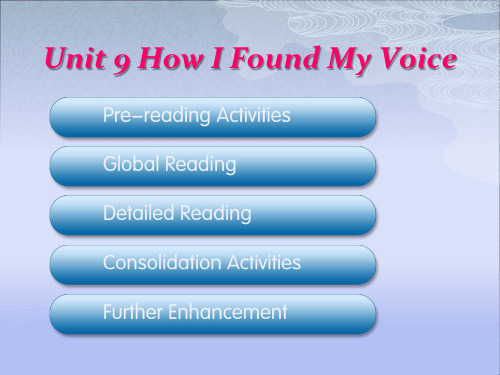
Audiovisual supplement Cultural background
BERTIE
LIONEL BERTIE LIONEL BERTIE
If I fail in my duty... David could come back. I’ve seen the placards “Save Our King!” They don’t mean me. Every other monarch in history succeeded someone who was dead, or about to be. My predecessor is not only alive, but very much so. What a bloody mess! I can’t even give them a Christmas Speech. Like your Dad used to do? Precisely. Your father. He’s not here. Yes he is. He’s on that bloody shilling I gave you.
Audiovisual supplement Cultural background
1.Stuttering
Stuttering is a communication disorder that affects the fluency of speech. It begins during childhood and, in some cases, persists throughout the life span. The disorder is characterized by disruptions in the production of speech sounds, known as “disfluencies.” Disfluencies are not necessarily problematic; however, they can impede communication when a speaker produces too many of them or does not resolve them promptly.
综合英语4 UNIT9 language work

语言学习的应用: 将所学的语言知 识应用于实际生 活中,如与外国 人交流、阅读英 文原著、听英语 新闻等
跨文化交际:通 过了解不同文化 背景下的语言表 达方式和习惯, 提高跨文化交际 能力
语言学习的挑战 与应对:在日常 生活中遇到语言 学习挑战时,如 何应对和克服困 难,提高语言学 习效果
评估与反馈的 重要性:及时 了解学习进展, 发现不足,调
整学习策略
学习策略的调 整:根据评估 结果,针对性 地调整学习策 略,提高学习
效果
优化学习策略: 总结经验教训, 不断优化学习 策略,提高学
习效率
持续学习与进 步:保持积极 的学习态度, 不断调整和优 化学习策略, 实现持续进步
语言学习的挑战与对策
跨文化交流的实践案例:分享一 些成功的跨文化交流案例,展示 语言学习的实际应用价值
商务场合中的应用
商务英语沟通 技巧:掌握商 务场合中的基 本沟通技巧, 如礼貌用语、 表达方式等。
商务英语写作: 能够撰写商务 邮件、合同等 文件,注意语 言规范、准确、
清晰。
商务英语听说 能力:能够听 懂并准确表达 商务场合中的 需求和意见, 如谈判、会议
学习过程中的挑战与困难
语言环境不熟悉 文化背景差异大 语法规则复杂 词汇量不足
应对挑战的方法与策略
制定学习计划:制定明确的学习计划,合理安排时间,确保每天都有足够的时间用于语言学习。 多样化学习方式:采用多种学习方式,如听、说、读、写、看等,全面提高语言能力。 积极思考:在学习过程中积极思考,理解语言背后的文化背景和语境,加深对语言的理解。 不断练习:通过不断的练习,巩固所学知识,提高语言运用能力。
综合英语四第九单元
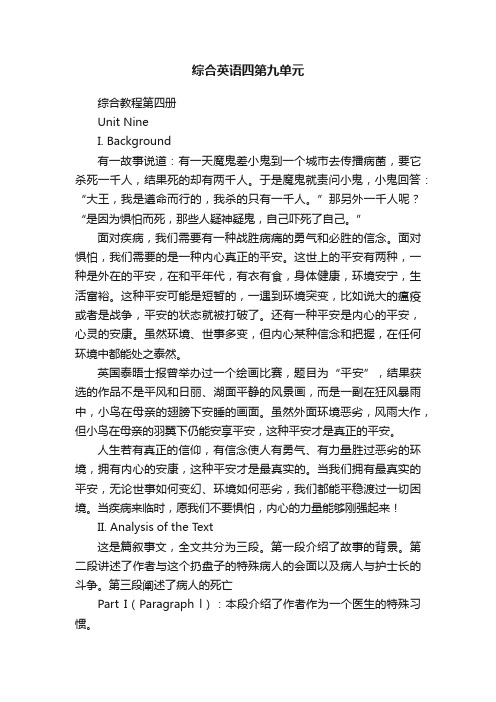
综合英语四第九单元综合教程第四册Unit NineI. Background有一故事说道:有一天魔鬼差小鬼到一个城市去传播病菌,要它杀死一千人,结果死的却有两千人。
于是魔鬼就责问小鬼,小鬼回答:“大王,我是遵命而行的,我杀的只有一千人。
”那另外一千人呢?“是因为惧怕而死,那些人疑神疑鬼,自己吓死了自己。
”面对疾病,我们需要有一种战胜病痛的勇气和必胜的信念。
面对惧怕,我们需要的是一种内心真正的平安。
这世上的平安有两种,一种是外在的平安,在和平年代,有衣有食,身体健康,环境安宁,生活富裕。
这种平安可能是短暂的,一遇到环境突变,比如说大的瘟疫或者是战争,平安的状态就被打破了。
还有一种平安是内心的平安,心灵的安康。
虽然环境、世事多变,但内心某种信念和把握,在任何环境中都能处之泰然。
英国泰晤士报曾举办过一个绘画比赛,题目为“平安”,结果获选的作品不是平风和日丽、湖面平静的风景画,而是一副在狂风暴雨中,小鸟在母亲的翅膀下安睡的画面。
虽然外面环境恶劣,风雨大作,但小鸟在母亲的羽翼下仍能安享平安,这种平安才是真正的平安。
人生若有真正的信仰,有信念使人有勇气、有力量胜过恶劣的环境,拥有内心的安康,这种平安才是最真实的。
当我们拥有最真实的平安,无论世事如何变幻、环境如何恶劣,我们都能平稳渡过一切困境。
当疾病来临时,愿我们不要惧怕,内心的力量能够刚强起来!II. Analysis of the T ext这是篇叙事文,全文共分为三段。
第一段介绍了故事的背景。
第二段讲述了作者与这个扔盘子的特殊病人的会面以及病人与护士长的斗争。
第三段阐述了病人的死亡Part I(Paragraph l):本段介绍了作者作为一个医生的特殊习惯。
PartⅡ(Paragraphs 2-13):讲述了作者与扔盘子的特殊病人的会面并暗示了他扔盘子的原因。
PartⅢ(Paragraphs 14-15):讲述了病人的死亡以及医生发现的秘密。
III.Words & Phrases Study文中出现的重难点单词及短语:spy, repose, facsimile, awkward, inert, probe, cure, accomplice1. spyv. discover by close observation观察<释例>He said that someone might be spying on the station and the pilot was ordered to keep track of the strange object.他说可能有人时基地进行侦察,于是便命令该飞行员跟踪这个怪物。
- 1、下载文档前请自行甄别文档内容的完整性,平台不提供额外的编辑、内容补充、找答案等附加服务。
- 2、"仅部分预览"的文档,不可在线预览部分如存在完整性等问题,可反馈申请退款(可完整预览的文档不适用该条件!)。
- 3、如文档侵犯您的权益,请联系客服反馈,我们会尽快为您处理(人工客服工作时间:9:00-18:30)。
1902-1968
Unit 9 The Pearl
Before Reading
Global Reading
Detailed Reading
After Reading
Background Information 1. About the author His first novel was published in 1929 (Cup of Gold) and his last in 1961 (The Winter of Our Discontent). He won the Pulitzer Prize for The Grapes of Wrath. He was awarded the Nobel Prize for Literature in 1962. 29 Academy Award nominations and 4 Academy Awards were given for adaptations of John Steinbeck stories.
Unit 9 The Pearl
Before Reading
Global Reading
Detailed Reading
After Reading
Background Information 1. About the author John Steinbeck was one of the most famous American writers of the 20th century. Steinbeck‘s novels can all be classified as social novels dealing with the economic problems of rural labor. In 1939 he published what is considered his best work, The Grapes of Wrath, the story of Oklahoma tenant farmers who, unable to earn a living from the land, moved to California where they became migratory workers.
Unit 9 The Pearl
Before Reading
Global Reading
Detailed Reading
After Reading
Background Information
Unit 9 The Pearl
Before Reading
Global Reading
Detailed Reading
1902-1968
Unit 9 The Pearl
Detailed Reading
After Reading
Background Information 2. About the Novella—The Pearl The Pearl is a 1947 novella by John Steinbeck. Like his father and grandfather before him, Kino is a poor diver, gathering pearls from the Gulf beds that once brought great wealth to Spain and now provided Kino, Juana, and their infant son Coyotito, with meager subsistence. Then, on one day like any other, Coyotito gets stung by a scorpion. Kino can‘t pay for a doctor to heal Coyotito, so he searches for a pearl. Kino then emerges from the sea with a pearl as large as a sea gull‘s egg, ―as perfect as the moon.‖
Unit 9 The Pearl
Before Reading
Global Reading
Detailed Reading
After Reading
Extended Reading
Introduction to Pearls and Australian Pearl Divers Australia is home to some of the finest pearls in the world. And the legendary history of pearl diving in Australia is _________. The pearl divers were the kings of the pearling industry. Daily, they risked their lives in the dark ocean depths and took all the risks of obtaining the precious shell. fortune A good diver could make a ______ in a few seasons. The number one diver was the most important man on the lugger. He located and picked up the shell and gave signals to position the boat above. He was diving the one who risked his life every day by donning the bulky _____ suit, divers‘ helmet and lead shoes to descend to the ocean floor to gather the valuable shell. The pearl diver also faced numerous undersea dangers while gathering the shell. The bends and sharks were a great concern.
Unit 9 The Pearl
Before Reading
Global Reading
Detailed Reading
After Reading
Extended Reading Directions: Watch the following video “Introduction to Pearls and Australian Pearl Divers” twice. For the first time, try to get a basic idea of what it is about and for the second time, fill in the blanks with the information you hear.
After Reading
Background Information 3. About the Movie—La perla La perla (The Pearl) is a 1948 film. The story is based on the novella The Pearl, by John Steinbeck, who also cowrote the screenplay for the movie. The movie was a great success and received several awards.
Unit 9 The Pearl
Before Reading
Global Reading
Detailed Reading
After Reading
Warming-up Questions Background Information Extended Reading
Free Discussion
Unit 9 The Pearl
Necklaces Pendants Bracelets
Unit 9 The Pearl
Before Reading
Global Reading
Detailed Reading
After Reading
Warming-up Questions 2. What do people usually think of pearl? What is the symbolic meaning of pearl? 3. What might happen if a very poor person came into possession of a very large pearl?
Before Reading
Global Reading
Detailed Reading
After Reading
Warming-up Questions 1. Do you possess any jewelry with pearl(s)? If no, do you want one? Why? Rings Earrings
Unit 9 The Pearl
Before Reading
Global Reading
Detailed Reading
After Reading
Background Information 2. About the Novella—The Pearl
With the pearl comes hope, the promise of comfort and of security at the cost of defying the system. A story about a Mexican folk tale, The Pearl explores the secrets of man‘s nature, the darkest depths of evil, and the disastrous effects of stepping out of the established system. Due to the novella‘s negative portrayal of opportunity and ambition, many suspect that, like much of his work, it advocates socialism. The novel is still widely read and fairly popular.
